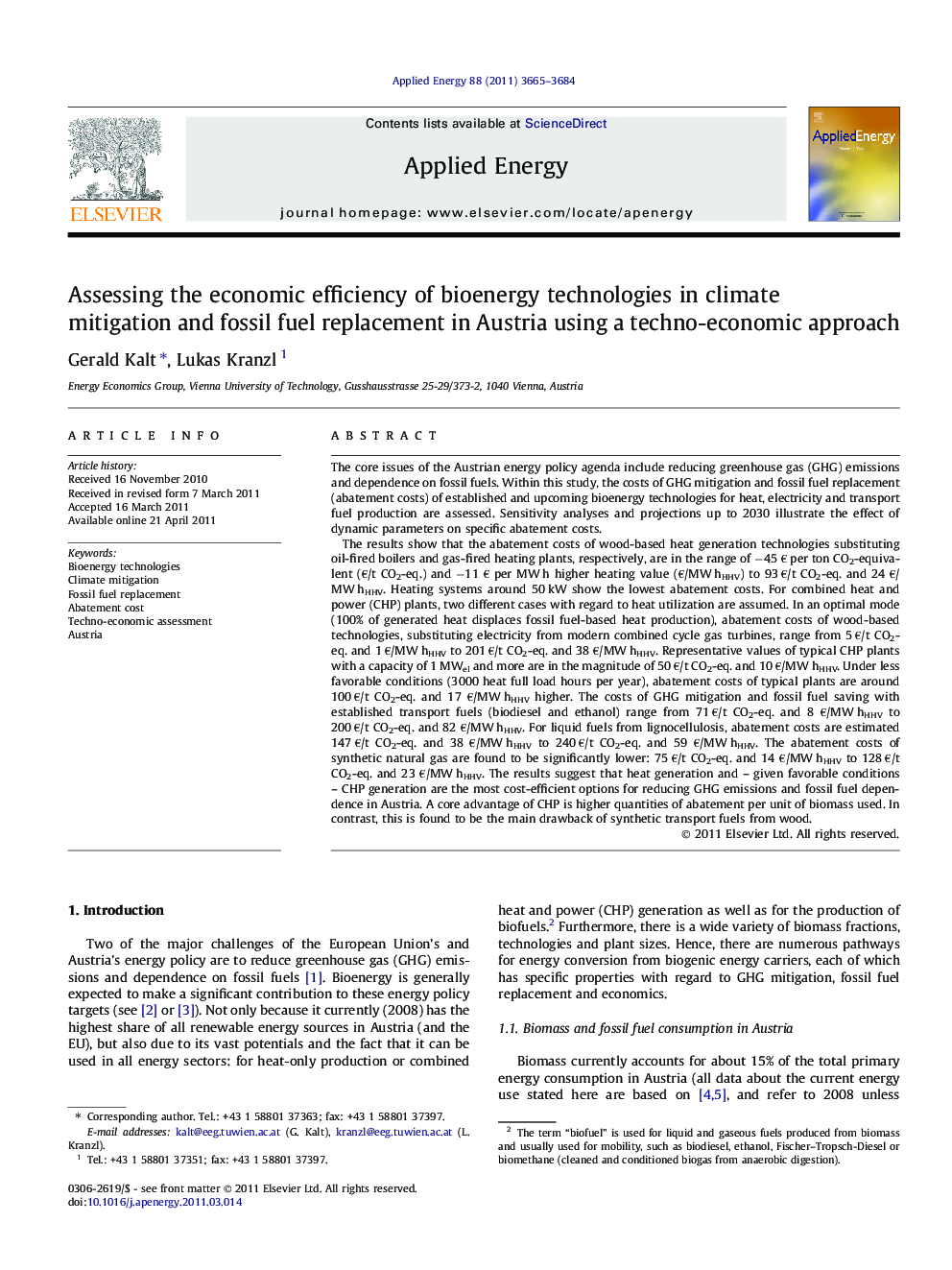| کد مقاله | کد نشریه | سال انتشار | مقاله انگلیسی | نسخه تمام متن |
|---|---|---|---|---|
| 244175 | 501944 | 2011 | 20 صفحه PDF | دانلود رایگان |

The core issues of the Austrian energy policy agenda include reducing greenhouse gas (GHG) emissions and dependence on fossil fuels. Within this study, the costs of GHG mitigation and fossil fuel replacement (abatement costs) of established and upcoming bioenergy technologies for heat, electricity and transport fuel production are assessed. Sensitivity analyses and projections up to 2030 illustrate the effect of dynamic parameters on specific abatement costs.The results show that the abatement costs of wood-based heat generation technologies substituting oil-fired boilers and gas-fired heating plants, respectively, are in the range of −45 € per ton CO2-equivalent (€/t CO2-eq.) and −11 € per MW h higher heating value (€/MW hHHV) to 93 €/t CO2-eq. and 24 €/MW hHHV. Heating systems around 50 kW show the lowest abatement costs. For combined heat and power (CHP) plants, two different cases with regard to heat utilization are assumed. In an optimal mode (100% of generated heat displaces fossil fuel-based heat production), abatement costs of wood-based technologies, substituting electricity from modern combined cycle gas turbines, range from 5 €/t CO2-eq. and 1 €/MW hHHV to 201 €/t CO2-eq. and 38 €/MW hHHV. Representative values of typical CHP plants with a capacity of 1 MWel and more are in the magnitude of 50 €/t CO2-eq. and 10 €/MW hHHV. Under less favorable conditions (3000 heat full load hours per year), abatement costs of typical plants are around 100 €/t CO2-eq. and 17 €/MW hHHV higher. The costs of GHG mitigation and fossil fuel saving with established transport fuels (biodiesel and ethanol) range from 71 €/t CO2-eq. and 8 €/MW hHHV to 200 €/t CO2-eq. and 82 €/MW hHHV. For liquid fuels from lignocellulosis, abatement costs are estimated 147 €/t CO2-eq. and 38 €/MW hHHV to 240 €/t CO2-eq. and 59 €/MW hHHV. The abatement costs of synthetic natural gas are found to be significantly lower: 75 €/t CO2-eq. and 14 €/MW hHHV to 128 €/t CO2-eq. and 23 €/MW hHHV. The results suggest that heat generation and – given favorable conditions – CHP generation are the most cost-efficient options for reducing GHG emissions and fossil fuel dependence in Austria. A core advantage of CHP is higher quantities of abatement per unit of biomass used. In contrast, this is found to be the main drawback of synthetic transport fuels from wood.
► Costs of GHG mitigation and fossil fuel replacement of bioenergy are assessed.
► Technologies include heat, CHP and biofuel production plants of different sizes.
► Abatement costs vary widely and depend on numerous parameters.
► Heat generation and (under favourable conditions) CHP are most efficient.
► Wood-based biofuels show low abatement quantity per unit of feedstock used.
Journal: Applied Energy - Volume 88, Issue 11, November 2011, Pages 3665–3684